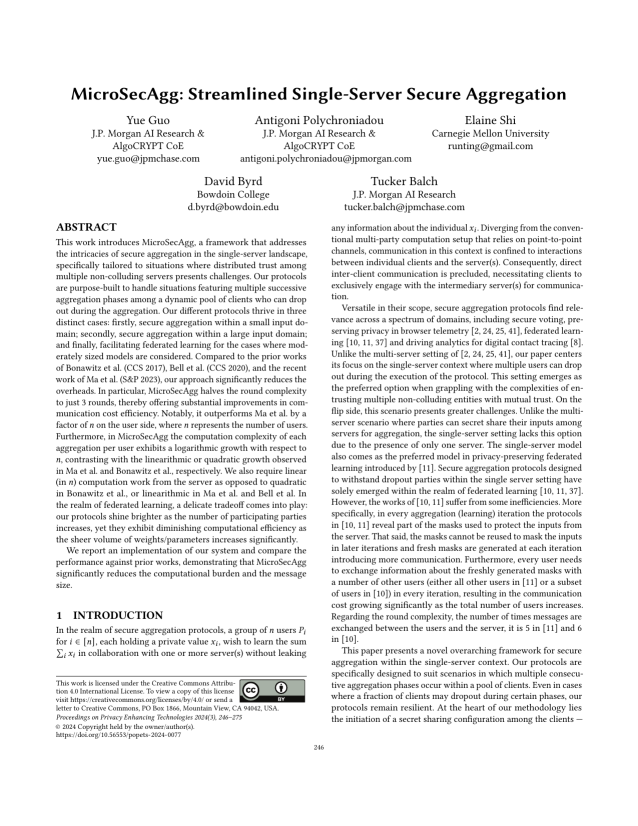MicroSecAgg: Streamlined Single-Server Secure Aggregation
Authors: Yue Guo (J. P. Morgan AI Research), Antigoni Polychroniadou (J. P. Morgan AI Research), Elaine Shi (Carnegie Mellon University), David Byrd (Bowdoin College), Tucker Balch (J. P. Morgan AI Research)
Volume: 2024
Issue: 3
Pages: 246–275
DOI: https://doi.org/10.56553/popets-2024-0077
Abstract: This work introduces MicroSecAgg, a framework that addresses the intricacies of secure aggregation in the single-server landscape, specifically tailored to situations where distributed trust among multiple non-colluding servers presents challenges. Our protocols are purpose-built to handle situations featuring multiple successive aggregation phases among a dynamic pool of clients who can drop out during the aggregation. Our different protocols thrive in three distinct cases: firstly, secure aggregation within a small input domain; secondly, secure aggregation within a large input domain; and finally, facilitating federated learning for the cases where moderately sized models are considered. Compared to the prior works of Bonawitz et al. (CCS 2017), Bell et al. (CCS 2020), and the recent work of Ma et al. (S&P 2023), our approach significantly reduces the overheads. In particular, MicroSecAgg halves the round complexity to just 3 rounds, thereby offering substantial improvements in communication cost efficiency. Notably, it outperforms Ma et al. by a factor of n on the user side, where n represents the number of users. Furthermore, in MicroSecAgg the computation complexity of each aggregation per user exhibits a logarithmic growth with respect to $n$, contrasting with the linearithmic or quadratic growth observed in Ma et al. and Bonawitz et al., respectively. We also require linear (in n) computation work from the server as opposed to quadratic in Bonawitz et al., or linearithmic in Ma et al. and Bell et al. In the realm of federated learning, a delicate tradeoff comes into play: our protocols shine brighter as the number of participating parties increases, yet they exhibit diminishing computational efficiency as the sheer volume of weights/parameters increases significantly. We report an implementation of our system and compare the performance against prior works, demonstrating that MicroSecAgg significantly reduces the computational burden and the message size.
Keywords: Secure Aggregation, Privacy-Preserving Federated Learning, Secure Computation, Privacy
Copyright in PoPETs articles are held by their authors. This article is published under a Creative Commons Attribution 4.0 license.

